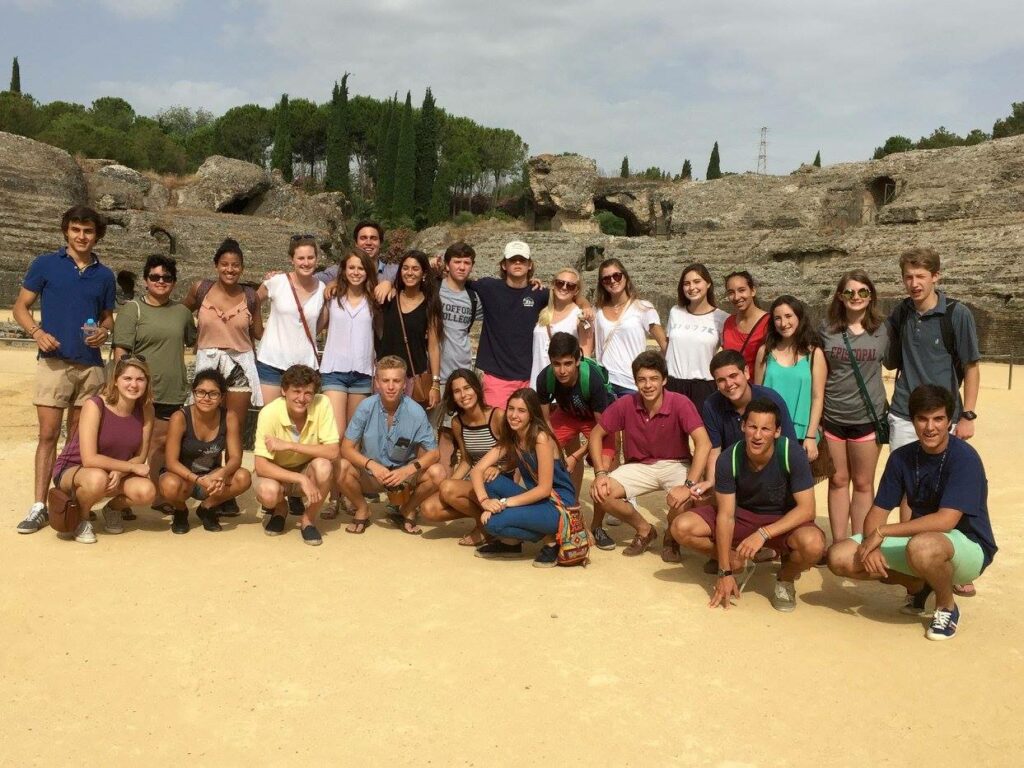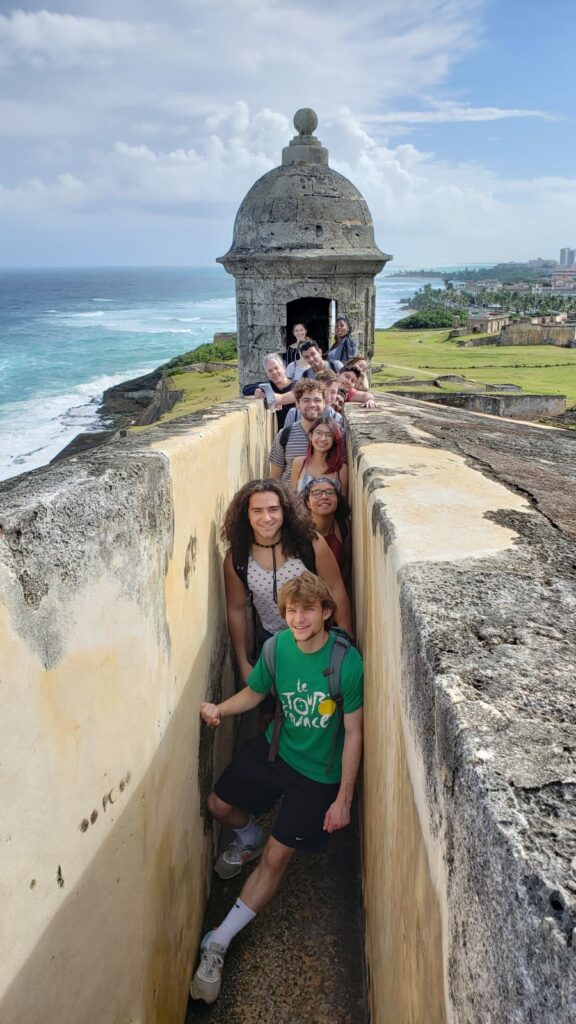What are the aims of the trip?
Stage one of planning a trip abroad is setting the objectives for the trip. Is there a theme you want to follow? What activities do you want your students to experience? How does the trip tie in with the program syllabus for their course?
It is important to have clear learning objectives because this will make choosing a destination and activities much easier. Also, it will help in the recruitment process to let parents know why they should send their children on this trip.
For example, at Alandis, a very popular theme among our clients is service learning-focused trips, where students learn about the culture and the people by contributing to its community. Another trip we planned was a physical education trip, where students got the chance to learn about the practices used in the country by observing clinics.
Choose a destination
After setting the learning goals for the trip, choosing the best destination to achieve them becomes more straightforward.
When choosing the destination, you should keep in mind these objectives and take into account the following:
Student safety
Ensure the country you choose is safe for your students and that their health system is good. It is also very important to inform your students how to be safe in the country and what to do in an emergency.
All our destinations are safe for students, but it is always important to research the cultural differences and how society acts in said countries. There are a lot of testimonies online that you should look up; here are some examples of studying in Spain and Cuba.
Also, set boundaries for students and parents to agree to before they go abroad.
Culture
Traveling to a different country usually means that there will be differences in culture and relationships with locals.
Make sure you are choosing a welcoming country since it will be the first time some of your students have traveled abroad, and you want to ensure they have the best experience.
Also, research local customs on inclusion; are LGBTQ+ individuals accepted in the country you are visiting? Check this website for more resources for the LGBTQIA community abroad.
Weather
Research your desired destination to know what the weather’s like and the best seasons to visit. A great resource to use is Accuweather, where you can look up the weather everywhere in the world.
Another way to research the weather of a country throughout the year is by checking the seasonal climate changes. Here are a few examples of our destinations’ monthly climatology by Climate Change Knowledge Portal:



Entry requirements
It’s important to know whether your students need to apply for a visa and if there are any vaccinations that they should get.
Even though the pandemic seems to be over, some countries still have requirements to enter. We have put together all the information about our destinations here.
Food restrictions
Nowadays, younger generations suffer from more food allergies and eating restrictions, or at least they are more aware of them. Ensure the country you are visiting and the places you are staying in have appropriate options.
Find a provider or a travel agency
Once your aims and destination are clear, you must choose a provider or travel agency to make your trip successful.
They would greatly help with the following steps of the planning process. For example, at Alandis, we help set up a budget, find the activities that best suit your group, and suggest the best trip dates.
Here are a few tips on how to choose the right provider:
- Read reviews and testimonials online from other people’s experiences.
- Make sure that they will customize your trip.
- Learn how they help you plan, recruit, and deliver the trip.
- Remember to read what they include: do they include all the meals? The airfare? Healthcare?
The advantage of putting your trust in a provider is, among others, the fact that they have a better understanding of the country and the needs of your group, which makes them a great support system. If you are still deciding whether you should have a provider, we’ve put together a list of all the benefits of working with a tour operator such as Alandis.
Set your budget
Knowing your budget or cost maximum per student is a defining factor and will influence the duration of your trip, the activities and visits you can do, and the students that can join the trip.
It is important to set a realistic budget that students can afford and that allows you to plan an exciting trip they will enjoy. Speak to external providers, like Alandis, for help finding the right balance between activities and budget for your students.
Select your ideal dates
The next step is to define the dates and the duration of your school trip abroad. To do this, you should consider the school’s requirements and dates of school breaks, including exams and holiday seasons.
Remember to take your budget into account! Prices may vary depending on the season, how much time in advance you are planning, and even if there’s an event happening in the places you visit.

Get approval from your school
After compiling all the information, write a proposal and present it to your school’s principal or relevant body. While writing the proposal, ensure your trip follows the school and school district policy regarding international school trips.
Start recruiting students
Once you have the approval from your school, it is time to start promoting your trip and recruiting students.
You can use many techniques and resources to spread the word about your trip, such as publication on the school website, sharing details on social media pages, putting up posters, handing out flyers in class, etc.
If you need a detailed recruitment plan for your trip, look at How to Recruit Students for your Study Abroad Trip.
Do the administrative work
The amount of work will depend on the provider you choose. For example, at Alandis, we take care of all the following tasks:
Payments
Set a date and an amount for the parents to make the deposit. Keep in mind that you’ll have to make some payments before the start of the trip.
Paying in advance key to lock in prices, for your provider to make reservations, and to have all your entrance fees already paid for while on your trip.

Passport
Remind the parents and the students that they must have valid travel passports. Many countries worldwide require you to have a few months left on your passport at travel time.
The number of months will depend on the destination. We recommend renewing your passport if it expires within 6 months of the end of the program. Better safe than sorry!
Visa
Some destinations need a visa to enter the country. Make sure to research it.
For example, US and Canadian citizens must apply for tourist visas to Cuba. To enter Europe, they don’t.
If you need clarification on the visa process, contact us at Alandis.
Travel Insurance
Most providers include travel insurance, but look at what they include in case you need to use it.
Insurances may vary on inclusions. The most basic inclusion is emergency health care, but others also include baggage insurance.
Also, there are countries like Cuba that require you to have travel insurance to enter the country, so make sure to check that as well.
Suggested Packing List
Share a packing list with parents, especially if the trip requires specific gear or clothing. Check, or tell parents to check, the weather forecast for your destination so they can pack accordingly.
Don’t forget to include the following:
- Passport
- Cash
- Toiletries
- Adapter electrical plug (if needed)
At The Abroad Guide, they have a very in-depth packing list that you can use as inspiration.
Set a meeting with parents and students
At Alandis Travel, we call this the pre-departure info session. It is a meeting with both parents and students, where we go through the itinerary and answer any questions or concerns they may have regarding the trip. It is also a great opportunity to give suggestions and reminders.
Summary: how to plan an international school trip abroad
Finding out how to plan an international school trip abroad is very demanding and time-consuming, but we are sure it would be worthwhile. As we mentioned throughout the article, there are many things to remember; we recommend you start planning early and collaborate with professional providers.
If you have any questions, please feel free to ask us. We are happy to help!


